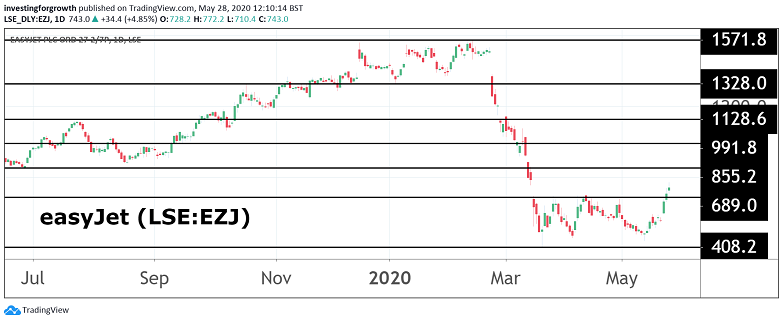easyJet extends two-week rally to 73%
After being one of the worst performers during the crisis, the budget airline is back in favour.
28th May 2020 12:31
by Graeme Evans from interactive investor
After being one of the worst performers during the crisis, the budget airline is back in favour.

Travel stocks remain the focus for bargain-hunting investors after today's latest Covid-19 update from easyJet (LSE:EZJ) took the rebound for its shares to 73% in just two weeks.
Hopes that easyJet and the rest of the travel industry can salvage something from this summer have increased in recent days, as government restrictions across Europe are relaxed.
The Luton-based carrier offered some cheer on this front today when it said booking trends on flights due to resume from 15 June had been encouraging, while demand for the rest of the summer is improving from a low base. Bookings for winter are well ahead of the same point last year, boosted by customers rebooking coronavirus-disrupted flights for later dates.
Shares surged more than 8% to 772p at one point in today's session, having traded as low as 446p on 14 May. It has been a similar story for British Airways owner International Consolidated Airlines Group (LSE:IAG) and cruise ship operator Carnival (LSE:CCL), with both 48% higher over the past fortnight.

Source: TradingView. Past performance is not a guide to future performance.
All three companies are still significantly cheaper than where they were back in February, with the values of Carnival and easyJet now below £3 billion and likely to result in their demotion from the FTSE 100 index in the next top-flight reshuffle in mid-June.
Considerable uncertainty remains about the outlook for travel stocks, with easyJet warning today that it thinks market demand will not recover to 2019 levels until 2023. It is responding to this scenario by reducing staff numbers by 30% and cutting its fleet size for the 2021 financial year to around 302 aircraft, which is 51 lower than it expected before the pandemic.
It plans to achieve the fleet reduction through the previously announced deferral of 24 new aircraft deliveries from Airbus and the re-delivery of leased aircraft. The company is also raising £500-£650 million from additional sale and leaseback deals.
This and other initiatives means easyJet will have generated additional liquidity of £2 billion to cope with operational cash burn for its grounded fleet of between £30 million and £40 million a week.
UBS's Jarrod Castle, who recommended investors sold easyJet shares in late January when the price was at 1,483p, thinks there is potential for the stock to recover to 1,320p.
He said:
“While the outlook remains challenging, the enhancement of liquidity and some positive booking trends are likely to be well received by the market.”
- Ian Cowie: tomorrow’s big winners in Asia
- Why this is a massive day for the FTSE 100 index
- Take control of your retirement planning with our award-winning, low-cost Self-Invested Personal Pension (SIPP)
No full-year guidance was given alongside today's update, with easyJet set to announce results for the six months to the end of March on 30 June. Next month's resumption of flying will comprise mainly domestic routes in the UK and France, with more destinations to follow.
By the fourth quarter of its financial year, which covers the peak period to 30 September, the company expects to be flying around 30% of last year's equivalent capacity.
CEO Johan Lundgren said: “We remain focused on doing what is right for the company and its long-term health and success, following the swift action we have taken over the last three months to meet the challenges of the virus.
“Although we will restart flying on 15 June, we expect demand to build slowly, only returning to 2019 levels in about three years' time.”
This outlook keeps up the pressure on civil aerospace engine manufacturer Rolls-Royce (LSE:RR.), whose shares fell 11% to 309p today after it emerged shareholder AKO Capital had sold a big holding at a reported price of 318p. The stock is down 55% since mid-February, despite a recovery over the past fortnight.
Full performance can be found on the company or index summary page on the interactive investor website. Simply click on the company's or index name highlighted in the article.
These articles are provided for information purposes only. Occasionally, an opinion about whether to buy or sell a specific investment may be provided by third parties. The content is not intended to be a personal recommendation to buy or sell any financial instrument or product, or to adopt any investment strategy as it is not provided based on an assessment of your investing knowledge and experience, your financial situation or your investment objectives. The value of your investments, and the income derived from them, may go down as well as up. You may not get back all the money that you invest. The investments referred to in this article may not be suitable for all investors, and if in doubt, an investor should seek advice from a qualified investment adviser.
Full performance can be found on the company or index summary page on the interactive investor website. Simply click on the company's or index name highlighted in the article.